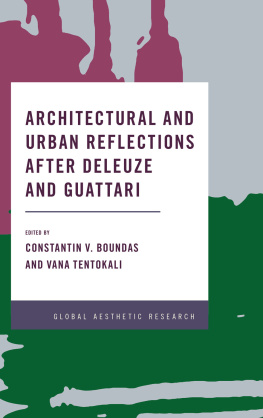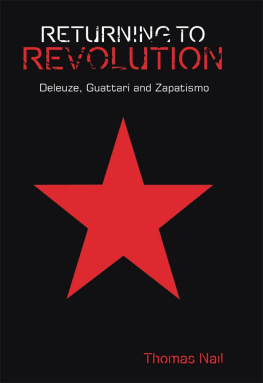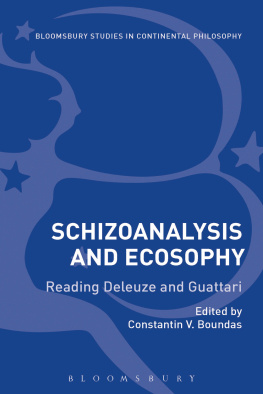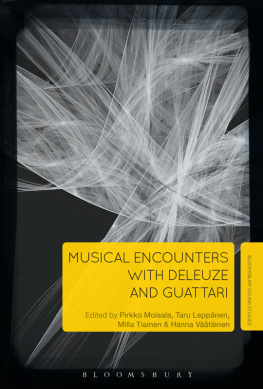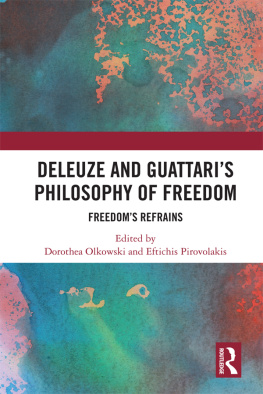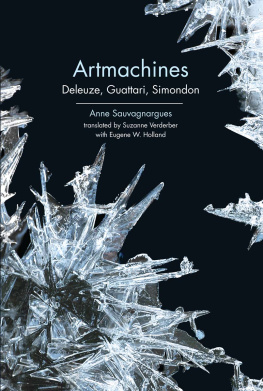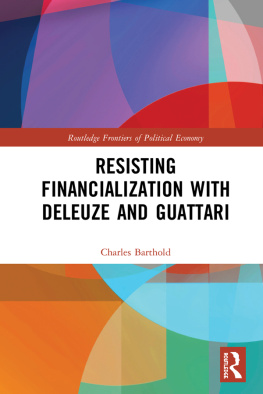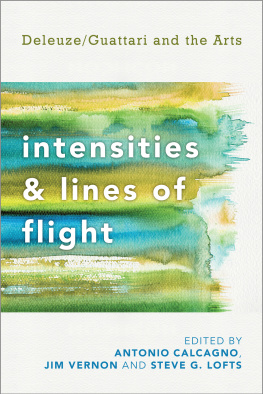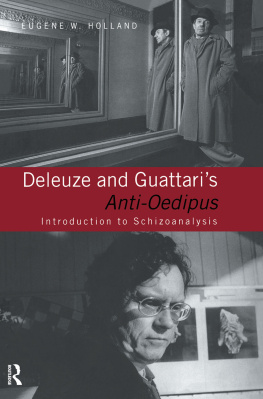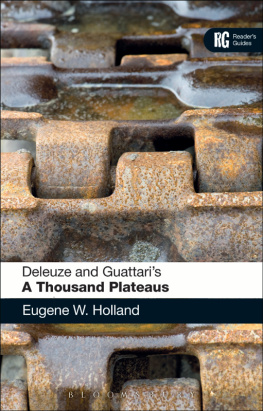Constantin V. Boundas and Vana Tentokali - Architectural and Urban Reflections After Deleuze and Guattari
Here you can read online Constantin V. Boundas and Vana Tentokali - Architectural and Urban Reflections After Deleuze and Guattari full text of the book (entire story) in english for free. Download pdf and epub, get meaning, cover and reviews about this ebook. year: 2017, publisher: Rowman & Littlefield, genre: Romance novel. Description of the work, (preface) as well as reviews are available. Best literature library LitArk.com created for fans of good reading and offers a wide selection of genres:
Romance novel
Science fiction
Adventure
Detective
Science
History
Home and family
Prose
Art
Politics
Computer
Non-fiction
Religion
Business
Children
Humor
Choose a favorite category and find really read worthwhile books. Enjoy immersion in the world of imagination, feel the emotions of the characters or learn something new for yourself, make an fascinating discovery.
- Book:Architectural and Urban Reflections After Deleuze and Guattari
- Author:
- Publisher:Rowman & Littlefield
- Genre:
- Year:2017
- Rating:5 / 5
- Favourites:Add to favourites
- Your mark:
- 100
- 1
- 2
- 3
- 4
- 5
Architectural and Urban Reflections After Deleuze and Guattari: summary, description and annotation
We offer to read an annotation, description, summary or preface (depends on what the author of the book "Architectural and Urban Reflections After Deleuze and Guattari" wrote himself). If you haven't found the necessary information about the book — write in the comments, we will try to find it.
Architectural and Urban Reflections After Deleuze and Guattari — read online for free the complete book (whole text) full work
Below is the text of the book, divided by pages. System saving the place of the last page read, allows you to conveniently read the book "Architectural and Urban Reflections After Deleuze and Guattari" online for free, without having to search again every time where you left off. Put a bookmark, and you can go to the page where you finished reading at any time.
Font size:
Interval:
Bookmark:

Series Editor: Joseph J. Tanke, Associate Professor, Department of Philosophy, University of Hawaii
The Global Aesthetic Research series publishes cutting-edge research in the field of aesthetics. It contains books that explore the principles at work in our encounters with art and nature, that interrogate the foundations of artistic, literary and cultural criticism, and that articulate the theory of the disciplines central concepts.
Early Modern Aesthetics, J. Colin McQuillan
Foucault on the Arts and Letters: Perspectives for the 21st Century, Edited by Catherine M. Soussloff
Architectural and Urban Reflections after Deleuze and Guattari, Edited by Constantin V. Boundas and Vana Tentokali
Living the Landscape: or The Unthought of Reason, Francois Jullien, Translated by Pedro Rodriguez (forthcoming)
Published by Rowman & Littlefield International Ltd
Unit A, Whitacre Mews, 2634 Stannary Street, London SE11 4AB
www.rowmaninternational.com
Rowman & Littlefield International Ltd.is an affiliate of Rowman & Littlefield
4501 Forbes Boulevard, Suite 200, Lanham, Maryland 20706, USA
With additional offices in Boulder, New York, Toronto (Canada), and Plymouth (UK)
www.rowman.com
Selection and editorial matter 2018 by Constantin V. Boundas and Vana Tentokali.
Copyright in individual chapters is held by the respective chapter authors.
All rights reserved. No part of this book may be reproduced in any form or by any electronic or mechanical means, including information storage and retrieval systems, without written permission from the publisher, except by a reviewer who may quote passages in a review.
British Library Cataloguing in Publication Data
A catalogue record for this book is available from the British Library
ISBN: HB 978-1-78660-598-6
Library of Congress Cataloging-in-Publication Data
Names: Boundas, Constantin V., editor. | Tentokali, Vana, editor.
Title: Architectural and urban reflections after Deleuze and Guattari / edited by Constantin V. Boundas and Vana Tentokali.
Description: Lanham : Rowman & Littlefield International, 2017. | Series: Global aesthetic research | Includes bibliographical references and index.
Identifiers: LCCN 2017043410 (print) | LCCN 2017046368 (ebook) | ISBN 9781786605993 (Electronic) | ISBN 9781786605986 (cloth : alk. paper)
Subjects: LCSH: ArchitecturePhilosophy. | Cities and townsPhilosophy. | Deleuze, Gilles, 1925-1995. | Guattari, Flix, 1930-1992.
Classification: LCC NA2500 (ebook) | LCC NA2500 .A71125 2017 (print) | DDC 720.1dc23
LC record available at https://lccn.loc.gov/2017043410
 The paper used in this publication meets the minimum requirements of American National Standard for Information SciencesPermanence of Paper for Printed Library Materials, ANSI/NISO Z39.481992.
The paper used in this publication meets the minimum requirements of American National Standard for Information SciencesPermanence of Paper for Printed Library Materials, ANSI/NISO Z39.481992.
Printed in the United States of America
NEKYIA
For his indelible trace in digital regionalism
We dedicate this volume
to Professor Dimitris Papalexopoulos
Ph.D Paris I (Sorbonne), D.P.L.G., Architect, National Technical
University of Athens
Constantin V. Boundas and Vana Tentokali
Most of the chapters of this book had an earlier life as contributions to the International Conference, Gilles Deleuze and Flix Guattari: Refrains of Freedom, held in Athens, Greece, between the 24th and the 26th of April 2015. They have been revised and are now surrounded by chapters written for the sake of the present publication. The editors of this volume (an architect and a philosopher) chose to include chapters with three thoughts in mind: (1) to highlight reflections of architects, landscape architects, urban architects and planners that have been, in the past twenty years, working and writing under the influence of Deleuze and Guattari; (2) to make the collection useful to those who are curious to find out what a philosopher/creator of concepts (Deleuze) and a schizoanalyst/political activist (Guattari) have to do with designers (of architecture, landscape architecture and urbanism); and (3) to offer it as a road sign at the intersection of philosophy, architecture and ethics that would be an introduction to the discourse and practice of experts in the fields, without being boring or trite.
The inscription of philosophical thought in the theory of architecture is not something new. There has been a long tradition of interconnection between the two, since architecture, as it builds up its own theoretical discourse, never fails to seek awareness with the preoccupations of the philosopher, the questions he or she raises and the tentative answers that he or she gives. Unlike those humanities which, according to Michel Foucault, try to be self-founded, architecture has resisted the temptation to proclaim its autonomy. Its resistance may have been helped by the fact that it comes with two hypostases, floating as it is between science as a toolkit, and art, as a fertile source of affects and qualities. Naturally, the kind of interconnection between architecture, science and art, being always open to new questions, evaluation and revisions, depends on parameters determined by the varying historical conjunctures and contexts (Sykes 2010, 18). Ever since the 1960s, for example, architecture seems to have shifted closer to science (particularly to the new sciences) importing and adapting concepts and techniques from the theories of chaos, complexity and the non-linear or topological geometries, as much as exploring and making use of them as methodological tools in its own everyday practices. But, on the other hand, in being the art of building form, architecture, during the same time period, did not fail to be mindful of the theoretical frames wrought by philosophers with problems and solutions of their own, whose image of thought could prove congenial to its own experimentation and work.
Ever since the 1960s, two philosophical trends the deconstructive philosophy of Jacques Derrida and the difference and repetition philosophy of Gilles Deleuze and Flix Guattari have been promising to provide the philosophical support that was needed. These two bodies of discourse replaced the idea of static structure with the search for modulation, transformation and difference and undertook to explain the emergence of structure and form from the formless and the chaotic. The emphasis shifted from an architecture and urbanism of objects to an architecture and urbanism of process. Our volume focuses on the dialogue that has been established between architecture, urbanism and the Deleuzoguattarian image of thought a dialogue that, for the moment, at least, has brought close together the philosophers creation of concepts, the production of affects of the artist and the delineation of functions of the new scientist. We do not believe that this dialogue is based on causal connections between the concepts invented, the affects experienced and the functions combined. It is rather a task fulfilled by the practitioners in each field (philosophy, art and science) who,in the pursuit of problems proper to their discipline, have become aware of the fact that practitioners in neighbouring disciplines confront questions and problems of a similar kind.
Dismantling and reconnecting otherwise have been l aire du temps. Philosophers were ready to put an end to the soliloquy of the Cartesian subject and to chip away at the foundations of the ghostly transcendental ego the same time that architects and urbanists were looking for ways to shake up the foundations of
Font size:
Interval:
Bookmark:
Similar books «Architectural and Urban Reflections After Deleuze and Guattari»
Look at similar books to Architectural and Urban Reflections After Deleuze and Guattari. We have selected literature similar in name and meaning in the hope of providing readers with more options to find new, interesting, not yet read works.
Discussion, reviews of the book Architectural and Urban Reflections After Deleuze and Guattari and just readers' own opinions. Leave your comments, write what you think about the work, its meaning or the main characters. Specify what exactly you liked and what you didn't like, and why you think so.

